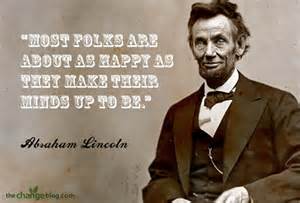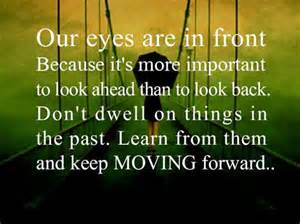
“A grandfather is talking with his grandson and he says there are two wolves inside of us which are always at war with each other.
One of them is a good wolf which represents things like kindness, bravery and love. The other is a bad wolf, which represents things like greed, hatred and fear.
The grandson stops and thinks about it for a second then he looks up at his grandfather and says, “Grandfather, which one wins?”
The grandfather quietly replies, the one you feed.” (A Tale of Two Wolves, Cherokee Proverb)

 Do you ever find yourself in conflict with as American author Stephen King calls it “…a voice from the attic of my mind” (from an excerpted college newspaper column, king’s garbage truck, in Hearts in Suspension, page 222) or the chatter in your mind? Does your chatter have a good and bad side? A positive and negative side? An optimistic (cheery) and a pessimistic (gloomy) side?
Do you ever find yourself in conflict with as American author Stephen King calls it “…a voice from the attic of my mind” (from an excerpted college newspaper column, king’s garbage truck, in Hearts in Suspension, page 222) or the chatter in your mind? Does your chatter have a good and bad side? A positive and negative side? An optimistic (cheery) and a pessimistic (gloomy) side?
In the story above, this inner voice or the chatter in our mind is depicted as two wolves. Which wolf, which inner voice, do you find yourself feeding? Fueling? Is it the positive, cheery one or the negative, gloomy one? Does the situation you find yourself in determine which one you feed and choose to give strength to?

 Personally, no matter the situation, I try to feed my good wolf. I try to do what is necessary to give it strength to get me through the challenging, tough, and rough moments in my life. I have found it to be more productive in the long run to be positive and optimistic no matter what. But what if the bad wolf is the stronger one, the one who seems to control responses and reactions? When the bad wolf seems to be getting in the way of dealing productively with a situation, then we need to diminish its strength and quiet it which may allow the good wolf to gain control.
Personally, no matter the situation, I try to feed my good wolf. I try to do what is necessary to give it strength to get me through the challenging, tough, and rough moments in my life. I have found it to be more productive in the long run to be positive and optimistic no matter what. But what if the bad wolf is the stronger one, the one who seems to control responses and reactions? When the bad wolf seems to be getting in the way of dealing productively with a situation, then we need to diminish its strength and quiet it which may allow the good wolf to gain control.
Some things we can do to tame the bad wolf and quiet that negative chatter are:
LIMIT THE ATTENTION GIVEN THE NEGATIVE CHATTER. Avoid allowing the negative chatter to dominate thoughts. Any emotions we are feeling need to be dealt with; however, we must not dwell on any of the emotional lows (anger, fear, sadness, frustration, sorrow). If we give the emotional lows all the attention, they will overtake everything. Instead, we need to acknowledge them but move on to understanding and using positive chatter – hope, belief, solution – to help us move to what can and will be.

STOP IDENTIFYING WITH THE NEGATIVE CHATTER. We need to avoid defining ourselves based on the negative chatter. American industrialist Henry Ford said, “Whether you believe you can do a thing or not, you are right.” If we tell ourselves enough times that we can’t or shouldn’t or don’t deserve or… then we won’t be able to or won’t get whatever we are striving for. We shouldn’t be afraid to question why we think that way.

REFRAME THE NEGATIVE CHATTER. Sometimes just tweaking what the “bad wolf” is telling us may help allow what the “good wolf” is saying to come to the forefront. Think about it? Which statement gives you more hope? ‘I’m having a bad day.’ or ‘I’m having a bad moment today.’ The second statement is an example of a “good wolf” thought – in the 24 hours I am given today, these five minutes are not good ones. There is a huge difference in our perception when we put the chatter in a workable context.

REPLACE THE NEGATIVE CHATTER WITH A BETTER, MORE POSITIVE THOUGHT. Most often, the things that we think are just the way it has to be is just an assumption that at some point we decided to agree with. First, we must stop agreeing! Replace ‘There is no way I can learn that new computer program’ with ‘I may not be the best at it and it may take me some time, but I am willing to give a try at that new computer program.’ Stop feeding the negative chatter with time and attention. If we stop feeding the negative chatter and start feeding a more positive belief/thought, the old one will die and the new one will blossom and flourish! We need to follow the advice of Aristotle (ancient Greek philosopher and scientist), “We are what we repeatedly do. Excellence, therefore, is not an act but a habit.” We can substitute positive in place of excellence in his advice. Make being positive your habit.

GET RID OF THE NEGATIVE “TAPE” PLAYING IN YOUR HEAD. Those constant negative thoughts, negative beliefs really take a toll on us. Avoid judging and labeling stuff as bad or not worthy or not capable. These beliefs truly limit us and hold us back. Create a list of things to do (I really want to learn that new computer program). Next, create a list of reasons what is preventing those things from happening (I’m too old to learn something new; I don’t have the time to learn the new computer program; Computer stuff is too hard). While some things on your list may be accurate, what things aren’t? It is the inaccurate (the negative) beliefs that need to be changed?

WORK TOWARD A CALMER SELF. When we are relaxed and calm, there seems to be less negative chatter and we seem to have more control over our thoughts. When we worry and are stressed, we lose control over the chatter and the worst of thoughts have a way of gaining a foothold. So it behooves us to remain calm, cool, and collected and to stay in the present as much as possible. Do whatever it takes to stay relaxed. Meditate. (Meditation is a great way to quiet the fear-based negative chatter in our minds.) Practice deep breathing. Employ visualization techniques. Color. (Pick up one of the adult coloring books and let your inner child help you calm down.) Say a mantra.

“We are what we think,” taught Buddha (ascetic and sage). So, why not think and be positive? Feed the positive. Starve the negative. Remember, the more we focus on the positive, on hope and possibilities, the more likely our actions will reflect that. Conversely, the more we focus on the negative, on our fears and frustrations, we are more likely to find more of which to be fearful or frustrated about. Make it a goal to quiet the negative chatter; starve it and allow the positive chatter to blossom and grow. Live with thoughts of hope and a positive tomorrow!!








